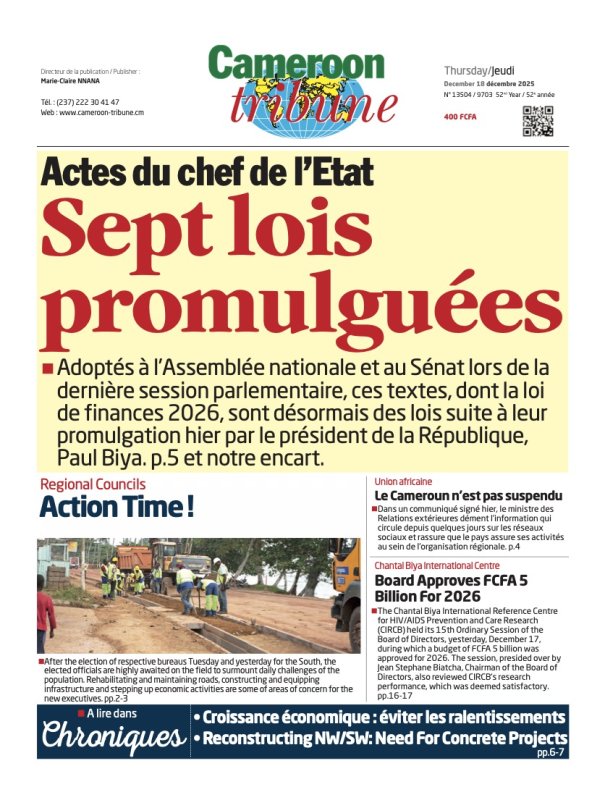Public Private Partnership: Irresistible Dev’t Stimulus!
- Par Godlove BAINKONG
- 11 Jul 2024 13:06
- 0 Likes
Ensuring adequate and equitable socio-economic development in any country is never the easiest of things for governments. More so in underdeveloped or developing economies where the population’s needs appear to be almost always growing at a geometric proportion, with resources taking a rather contrary direction. Cameroon is not different at all!
Solving the equation between the expressed or even basic needs of the population and available resources is where one country makes the difference from the other. Faced with such challenges, governments are bound to make choices; quite often based on their potentials.
Given that mobilising financial resources for the annual State budget is either never easily realistic or substantial enough, especially for the execution of giant projects, most governments sometimes resort to the public/private partnership model for financial their economies. The merits of the funding mechanism is that it enables governments to procure and deliver public infrastructure and services while maximising the resources and expertise of the private sector. This is through risk-sharing arrangements. In other words, public/private partnership enables governments to transfer the cost and risk of huge and significant infrastructure projects to a specialist private entity, through the Build-Operate-Transfer formula. Through this, the operator has the potential to make lots of money from the executed project during the operational phase before handing it to government when the duration expires. An opportunity for sharing resources and reducing financial burden on the public sector and at the same time enabling the private sector to access public sector resources to develop and deliver projects. Quite suitable for large-scale government projects such as roads, bridges or hospitals, to be fully developed with private funding through win-win deals.
A mutually-beneficial venture with well-defined terms which works better when private-sector technology and innovation combine with public-sector incentives to complete work on time and within an outlined budget. With it, speedy project execution is almost guaranteed and efficacy of the assigned project nearly ascertained. An irresistible growth catalyst that should be well studied and wisely embraced to push through heavy but vital growth projects.
Implementing public/private partnership projects therefore requires thorough preparation and a high level of expertise from contracting authorities entrusted with executing such projects. The expertise is crucial across all project phases, covering preparation, evaluation, tendering and monitoring of project implementation. More so as poorly designed and executed projects through this model can fetch economic woes for the country, as its potentials would have been forfeited for almost unsure benefit.
This logically explains why the World Bank in a presentation titled, “How Can Public/Private Partnerships (PPPs) be successful?” posits that in-depth internal reflection and workable policies are imperative before take-off. These include among others, a robust policy, institutional and regulatory framework, including on assessment and management of fiscal risks and contingent liabilities and an extended database of bankable projects, identified through clear processes of priority and well screened for suitability assurances.
This entails comprehensive approach to creating a supportive environment for PPPs and the contribution of related laws and units definitely vary from one country to another; depending on each context and probably design conditions. Cameroon boasts of the Support Council for the Realisation of Partnership Contracts (CARPA). Its mission is to contribute, through its expertise, to the creation and renewal of public infrastructure and equipment as well as to improving the quality of the public sector within the framework of large-scale technical and financial projects to be carried out, through a partnership contract.
The centre of expertise, serving as a “One-stop-shop” for PPP stakeholders, particularly investors, is certainly redoubling efforts but results of projects executed within this framework suggest the economic booster is still largely untapped. Despite already identifying PPPs as an essential lever for accelerating the development of public infrastructure and upholding the expertise of the private sector as well as private financing, the country is still lagging behind within this funding framework. The 38.5 km 2x2 lanes extensible to 2x3 Lolabe-Kribi express road constructed to the tune of FCFA 250 billion with financing from China’s Eximbank and the government of Cameroon in the port city of the Ocean Division is an example of rare PPPs projects in Cameroon. It is greatly facilitating traffic from the Mboro port site to the rest of the country and to the entire central Afri...
Cet article complet est réservé aux abonnés
Déjà abonné ? Identifiez-vous >
Accédez en illimité à Cameroon Tribune Digital à partir de 26250 FCFA
Je M'abonne1 minute suffit pour vous abonner à Cameroon Tribune Digital !
- Votre numéro spécial cameroon-tribune en version numérique
- Des encarts
- Des appels d'offres exclusives
- D'avant-première (accès 24h avant la publication)
- Des éditions consultables sur tous supports (smartphone, tablettes, PC)











Commentaires